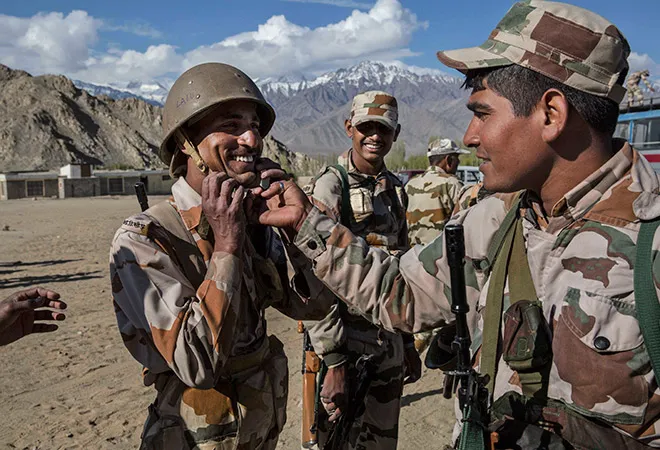-
CENTRES
Progammes & Centres
Location
National security has always been a part of national politics. What has changed is only the way this issue is now playing out in the public domain.

If we accept the Clausewitzian dictum that “war is the continuation of politics by other means”, then clearly national security cannot be divorced from politics. Those clucking their disapproval and behaving as though some great calamity has befallen India because national security is now very much an election issue, are being disingenuous when they seek to keep national security out of the ambit of competitive politics. National security has always been a part of national politics. What has changed is only the way this issue is now playing out in the public domain.
In the past, public discussions on national security were esoteric, dominated by a small group of elites who operated within their own echo chamber. This was in part possible because it was so much easier to control the debate — newspapers, radio and TV could and did shun voices that didn’t quite conform to the ‘consensus’ they peddled. Therefore, in spite of the fact that the street always had a view, it was haughtily ignored by those who framed, analysed and implemented national security.
Today, the street can no longer be ignored because it has now got the tools to make itself heard. And while the elite would like to continue to cut out this ‘noise’, the politician is forced to respond to the vocal, visible and vehement views of the street on national security. The democratisation of the policy discourse has therefore led to the politicisation of defence, security and foreign policy in ways that have not been seen before.
No savvy politician will ever let go of any opportunity to use national security to enhance his or her political capital. Even if certain politicians eschew the temptation to cash in on their palpable success in the domain of national security, their opponents are unlikely to resist the temptation to exploit any failure in this field. This means that even if Prime Minister Narendra Modi and his acolytes hadn’t milked or, more appropriately, done the chest thumping after the 2016 “surgical strikes” or the 2019 Balakot air strikes, his opponents would have torn him apart had anything gone wrong.
In a political setting where the political executive calls the shots on issues of war and peace and the armed forces follow the orders and the policy laid down by the political leadership, it is the politician who will get the credit and the accolades when things work out, and face the heat when they don’t.
This means that even if national security isn’t politicised by one side, it will be by the other. One primary reason why Sardar Patel is adulated is because of how he fused the nation by amalgamating the Princely States and taking strong action in Junagarh and Hyderabad. Had the ‘police action’ in Hyderabad gone wrong, would Patel still be a revered figure? Wasn’t Jawaharlal Nehru pilloried for the 1962 disaster even though a year earlier when Goa was annexed he basked in the glory of that event?
During the Kargil war in 1999, the Congress party lampooned the Vajpayee government by floating a hot air balloon of a bus turned upside down, mocking the Prime Minister’s Sada-e-Sarhad diplomacy. That India kicked out the Pakistanis from Kargil turned the tables and allowed the BJP to romp home in the elections later that year. Similarly, during the Doklam crisis, didn’t the Opposition take constant potshots at Prime Minister Modi, mocking his ‘jhoola diplomacy’ with the Chinese president? Wasn’t that politicisation of national security?
Suffice to say that even though national security has always been a political issue and has had a play in elections, the ones who complain the loudest are those who are on the receiving end of this issue. That’s either because they have failed on this front, or because their opponents have succeeded in capturing and monopolising the topic.
There is of course some heartburn over what is being called the politicisation of the armed forces. But this again is nothing new. There was a time when the armed forces were seen as loyalists of the grand old party.
Today it appears the shoe is on the other foot and a large part of the soldiery tends to see the BJP as articulating its thinking much more robustly than any other party. As long as the politicisation doesn’t interfere with or disturb the internal coherence and chain of command of the army, it should be seen as nothing more than an outreach to an important constituency. After all, soldiers and their families are also voters.
This commentary originally appeared in First Post.
The views expressed above belong to the author(s). ORF research and analyses now available on Telegram! Click here to access our curated content — blogs, longforms and interviews.

Sushant Sareen is Senior Fellow at Observer Research Foundation. His published works include: Balochistan: Forgotten War, Forsaken People (Monograph, 2017) Corridor Calculus: China-Pakistan Economic Corridor & China’s comprador ...
Read More +